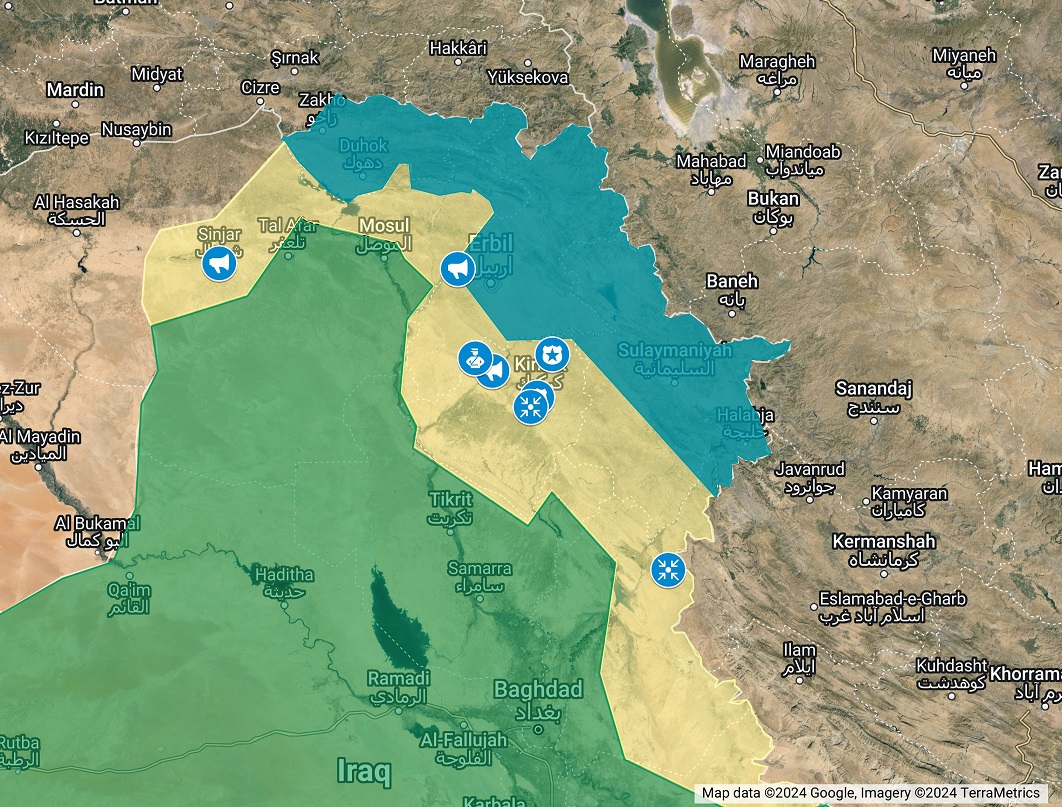2K
A biweekly brief of events and news occurred in the disputed territories.
Kirkuk
- On February 4, several Kurdish and Turkmen farmers, residents of the Topzawa village, held a press conference, calling on lawmakers to repeal the current bill in the parliament that is calling to demolish the Ba’th regime’s laws. While the Kurds are for annulling the laws, the farmers seek a modification on the bill to guarantee that their lands will return to them, and the current bill does not solve the issue. The former regime has contracted hundreds of thousands of Kurdish lands to Arab settlers, mainly from the Haweja distinct, part of the arabization policy. In a separate incident, on February 12, several Arab settlers attempted to occupy Kurdish lands near the Sargaran subdistrict. The settlers attacked a Kurdish village with heavy farming equipment. While they failed to do so, currently they are working to divert the water stream toward their villages, according to locals. Sargaran remains under Arabization policy and often issues erupt between Kurds and Arabs. Recently, the ultra-nationalist Turkmen Lawmaker, Arshad al Salihi, admitted that the Iraqi federal government has “legitimized” the Arabization after 2017, who fled to Kirkuk in 2014. Salihi who is a controversial figure, often attacks the Kurds and their rights, has been a big supporter of the Iraqi military’s occupation of Kirkuk.
- On February 5, the Kirkuk provincial council held its inaugural meeting in presence of Kurdish members amid the boycott of Arab and Turkmen representatives. The session failed to elect a speaker since the majority requires nine votes out of the sixteen seats. The Kurds and the Chrsitans encompass are in a coalition with eight seats. The Kurdistan Democratic Party (KDP) and the Patriotic Union of Kurdistan (PUK) met and agreed that the next governor post should be for the Kurds as they form the majority. As the meeting adjourned to an unknown date, the Kurdish members held a press conference and expressed “respect” for the boycott decision by the other members. In the following days, an unconfirmed report suggested that part of the Arab coalition, mainly the head of the Arab Leadership bloc, Mohammed al Timimi, suggested dividing the governor’s post into two terms, two years for each Kurds and Arabs.
- After years of planning and pledges by the federal government, the Kirkuk police are set to take over the security file from the Iraqi military on March 1, which has controlled the province since October 16, 2017, after removing the Peshmerga forces. Before the process, several Iraqi security forces had visited Kirkuk, including the chief of staff of the armed forces. However, ISIS (Da’esh) remains a serious threat to the region, including in eastern and northern parts where it used to be free of terrorism before 2017. On February 13, a joint security operation between the Peshmerga forces and the Iraqi military occurred near the Shwan district. The Peshmerga Affairs Ministry said the operation aimed to “eliminate” Da’esh in the area.
- On February 8, an oil pipeline near Kirkuk’s belts was damaged by unknown individuals, resulting in a large fire. The pipeline transports oil from the Jabal Bour oil field to the North Oil Company (NOC). Oil smugglers often pierce oil pipes and take tankers of oil. This coincides with the continuation of the halt of oil exports in Kirkuk since March 2023. On February 2, the State Organization for Marketing of Oil (SOMO) released the statistics for oil exports in Kirkuk, in which the gross came at $29,863,233 from exports to Jordan. The average price for a barrel was $64.31 for 464,306 barrels of oil.
Khanaqin
- Similar to Kirkuk, political parties in Khanaqin have yet to reach an agreement and form the local government, as two rounds of the Diyala’s provincial council meetings failed to elect a speaker. However, the dispute is between the Sunnis and the Iranian-backed winners, as both sides aim to win the governorship. The Kurds in Khanaqin won a seat, and it’s unclear whether they will gain any senior post in the administration of the provincial council.
Shingal (Sinjar)
- In an exclusive interview with Al Arabiyah, the wife of the former leader of Da’esh terrorists, Abu Bakr al Baghdadi, admitted that he had ten Yazidi women enslaved. The spouse, Um Hudaifa, said she was courted since she “disagreed” with the enslavement method of al Baghdadi, adding that all the leaders of Da’esh had enslaved Yazidi girls. In 2014, the terrorist organization committed genocide against the Yazidis, abducting thousands of girls and women to serve as sexual slaves. While hundreds remain missing, last month, the Syrian Democratic Forces (SDF) freed a Yazidi woman and two of her children from the Hol camp, which holds families of the terrorists. On a separate note, some Yazidi public figures protested an amendment on the Yazidi Women Survivors law suggested by the Iraqi president, Latif Rashid. President Latif suggested the inclusion of other minorities suffering enslavement by Da’esh terrorists, including Christians. However, the Yazidis demand a new law for other minorities, fearing that their mixing the Yazidi victims with others will take away the speciality of the Yazidi Genocide. The Shingal region continues to face a lack of security and primary services. On February 5, the Yazidi lawmaker, Vian Dakheel, told Kurdistan24 that the federal government does not prioritize compensation for the Yazidi victims.

